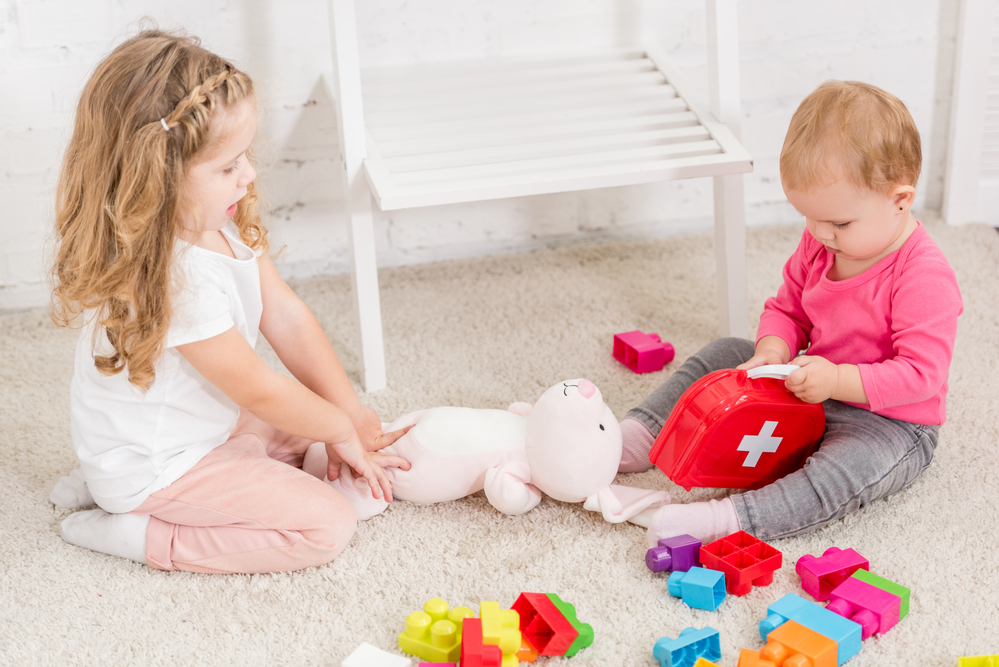
From year one on, one important thing that every child can learn to do is play. Not only does it help your child learn about the world and themselves, but it will also help improve cognitive, physical, social, and emotional well-being. But it isn’t as easy as just playing. From babies to preschoolers, at every age, your child will want to learn new things in new ways. Here is a guide to how each age plays.
Babies (0-1 Years Old)
Within the first year of life, play is all about exploration. Using all five of their senses, babies try to learn about the world around them. One of the most common ways they do this is by touching, tasting (“mouthing”), shaking, banging, or dropping it. And it all beings at approximately four months old when babies begin to reach and grasp new objects - shaking them like a rattle. Play is mainly a solitary activity at such a young age, and you will be your baby’s favorite playmate. From hand and finger puppets to playing “peek-a-boo” or squealing with anticipation as you creep forward saying, “I’m going to get you,” these types of plays entertain your baby while being educational - teaching them about language, social relations, cause-and-effect, and so much more. Some other types of toys that are great for babies include:
- Nursery Mobiles - While lying in their crib, the objects dancing above your baby’s head will help to stimulate their vision and develop their attention span.
- Mirror - Play with mirrors will help your baby become more self-aware by being fascinated with their face and changing expressions. In addition, realizing that it is their reflection will lead to them exploring other body parts - where they are and what they do.
- Ring Stack - When your baby is capable of grasping objects firmly in their hands, they will enjoy the ring stack - using the different colors and shapes to practice their fine motor skills. So not only does this toy help your baby learn and practice fine motor skills - but in the beginning, your baby will enjoy holding and mouthing on the rings.
Toddlers (2-3 Years Old)
As toddlers, your baby will become aware of objects and their functions. From stacking blocks and babbling into their toy phones to drinking out of their “big kid cup,” this is when pretend playing starts - laying the groundwork for preschool play. From the ages of 2 - 3 years old, this is when your baby will begin to be able to tell the difference between shapes and colors. At this age, a toddler will already love to scribble with crayons, build with blocks, and even do some puzzles. So when you are choosing toys for your toddlers, try toys that are bright, colorful, and extra fun for little hands - toys such as:
- Balls - Bounced, rolled, caught, or thrown, when your toddler plays with balls, it not only encourages physical activity but also helps to encourage and build gross motor skills, hand-eye coordination, and dexterity.
- Shape-Sorting Toys - From pegboard puzzles, nesting cups, and blocks to buckets with holes of different hole shapes and colors, shape-shorting toys will help your child develop their hand-eye coordination and problem-solving skills.
- Role-Playing Toys - Many different toys will encourage your child to role-play. For example, with play kitchens, doctor’s kits, and golf sets, your toddler can imitate the actions of you and other influential adults - helping your toddler learn how the world works. While playing with dolls and stuffed animals encourage pretend play, as well as aid in social and emotional development.
Pre-Schoolers (3-5 Years Old)
As preschoolers, this is when your child will start using toys and other objects for their intended use and purpose - with a world of possibilities at their fingertips. So many kids at this age believe in magic, monsters, fairies, princesses, and so many other magical and whimsical creatures. This is the age where pretend play becomes more elaborate due to their more advanced knowledge of the world.
As a preschooler, play becomes more elaborate because they have a better understanding of the world around them. Here are a few types of toys that your preschooler will enjoy while helping them with their development.
- Arts and Crafts - Arts and crafts help your preschooler improve their fine motor skills with activities like holding crayons and drawing pictures. But it also helps encourage creativity and nurture self-esteem.
- Blocks and Constructions Sets - Blocks and building sets help to encourage problem-solving skills and hand-eye coordination - this is done by building a tower and figuring out how to stop it from falling. But they also help your child express their imagination by creating buildings, vehicles, animals, and much more!
- Puzzles - Puzzles can help your child in several ways. Not only do puzzles help with coordination and dexterity, but they also help your child learn where things are in relation to other things, as well as logical thinking. It will also give your child a sense of accomplishment when they are finished.
